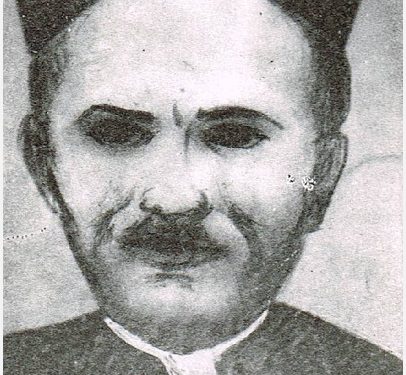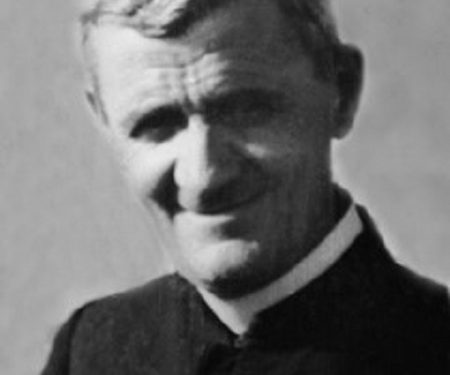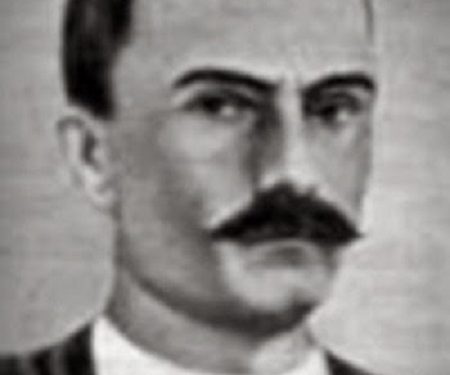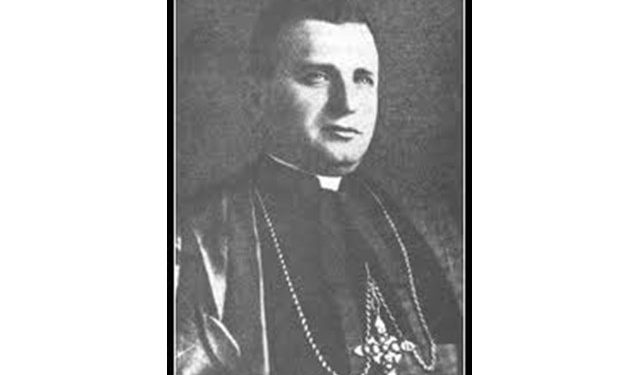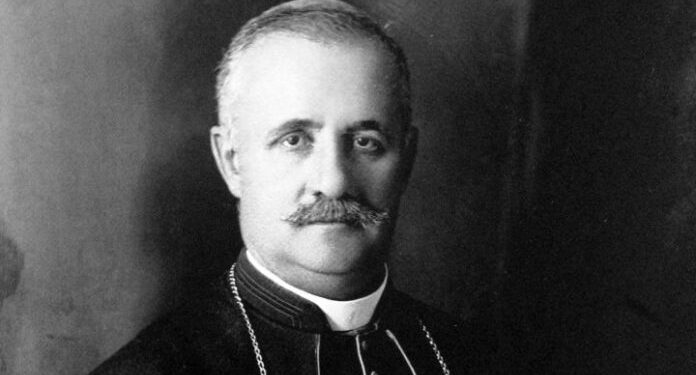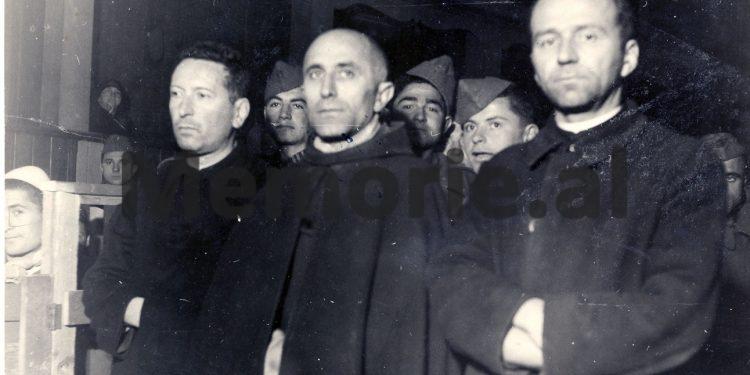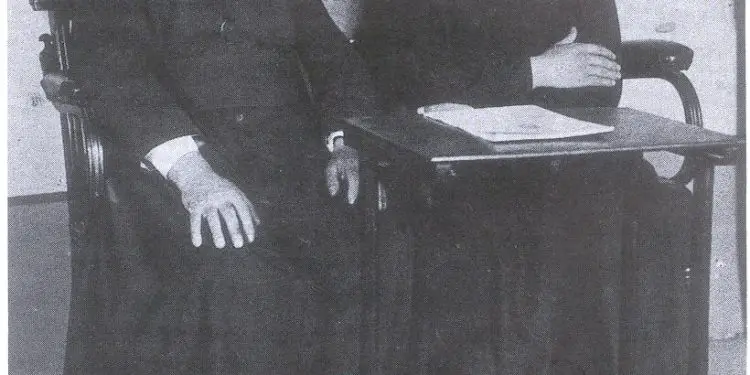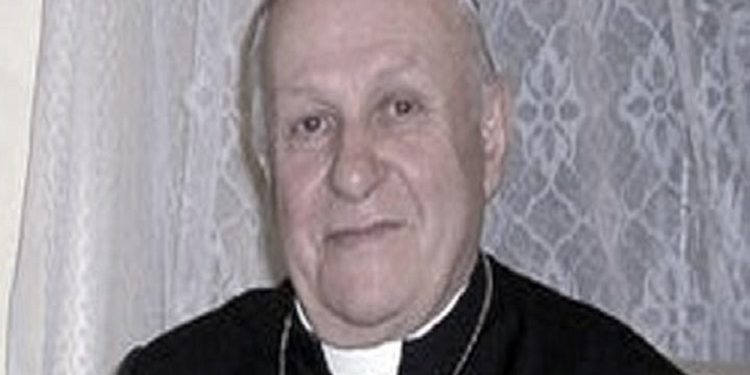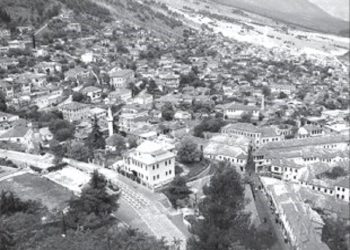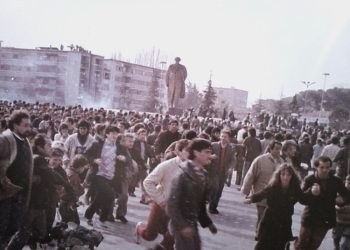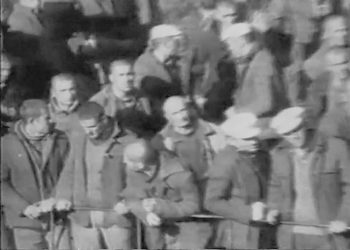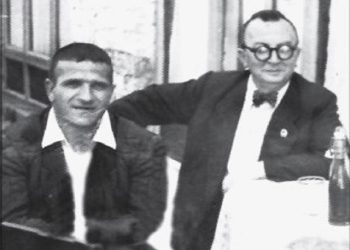By Dom Zef Simoni
The fourth part
Memorie.al/ publishes an unknown study by Dom Zef Simon, entitled “Persecution of the Catholic Church in Albania from 1944 to 1990”, where the Catholic clergyman from the city of Shkodra who suffered for years in the regime’s prisons Enver Hoxha and on April 25, 1993 he was ordained a Bishop by the head of the Holy See, Pope John Paul II, after describing a brief history of the Catholic Clergy in Albania, he stopped long at the persecution suffered by the Catholic Church in the communist regime, from 1944 to 1990. The complete study of Dom Zef Simon, starting from the attempts of the communist government of Tirana immediately after the end of the War to separate the Catholic Church from the Vatican, initially forbidding the Apostolic Delegate from returning to Albania , Imzot Leone GB Nigris, after his visit to the Pope at the Vatican in 1945 and then with the pressure and threats against Monsignor Frano Gjini, Gaspër Thaçi and Vincens Prenushti, who strongly opposed the “offer” of Enver Hoxha and as a result were fired by as well as the tragic fate of many other clerics who were arrested, tortured and sentenced to prison, such as: Dom Ndoc Nikaj, Dom Mikel Koliqi, Father Mark Harapi, Father Agustin Ashiku, Father Marjan Prela, Father Rrok Gurashi, Dom Jak Zekaj, Dom Nikollë Lasku, Dom Rrok Frisku, Dom Ndue Soku, Dom Vlash Muçaj, Dom Pal Gjini, Fra Zef Pllumi, Dom Zef Shtufi, Dom Prenkë Qefalija, Dom Nikoll Shelqeti, Dom Ndré Lufi, Dom Mark Bicaj, Dom Ndoc Sahatçija, Dom Ejëll Deda, Father Karlo Serreqi, Dom Tomë Laca, Dom Loro Nodaj, Dom Pashko Muzhani, etc.
Followed by the last number
Study of Dom Zef Simon
The third phase remains the worst, because it worked to destroy Albania, to systematically destroy the human character with so much evil and violence, the result of the fight against human virtues and against God, that the state and dictatorship worked to make man the slave of evil. The people never closed the churches. It was not the people and the youth who closed them, but the Labor party with Enver Hoxha.
This problem of closing churches and all religious institutions, which is religious and sociological, requires a detailed study and this can be achieved when the Albanian society has a calm and progress, a level and impartiality. The arrests of priests soon began. These were held in public, with a kind of trial before the people to expose the innocent innocent person. They would express with the worst words against Religion, God, Papacy, you called the priests traitors of the Homeland, that they had collaborated with fascism and Nazism and now you called them deceivers, liars and exploiters, who did not bring to society good and are against the culture of civilization.
They set foot on the prominent figures of European and Albanian literature and culture: Mons. Vinçenc Prennushi, Father Gjergj Fishta, Dom Ndre Zadeja, Father Bernardin Palit, Father Donat Kurti and Father Gjon Shllaku; they boasted with distortions as many Catholic priests as Buzuku died, but with those measures and tricks, as their games demanded. On April 7, at 5 pm, Dom Mark Hasin, assistant mayor of the city of Shkodra, was brought to the Pedagogical Institute “Luigj Gurakuqi” of Shkodra.
A large crowd had gathered in front of the Institute Square. Everything was provided with loudspeakers from the hall where this serious event took place and that Dom Marku tried to defend the cases for serious accusations against him. The security forces surrounding him did not allow him to speak. And finally, as soon as it got dark, on this very bad night with rain and storm that was expected to fall, they put the irons in the middle of the crowd and with the “Jeep” of the Security car were sent to the Shkodra Branch of Internal Affairs.
People had surrounded the car and were proud to see it. Thousands of people felt sorry for what they saw and felt, without being able to say a word. A great terror pervaded the country. The people felt deeply this oppression and the many believers saw that their personality was trampled upon, and from time to time the priests of the church, the people of work and knowledge in the banks of the accused. Shka would resemble an ordained priest, it also happens to a believer of his, his feelings and his ideals, because every baptized believer, is part of the priesthood of broad vision.
After a year, Dom Mark Hasi would appear in court, but not alone. He and four other priests would appear at the trial that would take place in the church of the Stigmatine nuns in Shkodra and would be: Dom Frano Illia, Dom Zef Bici, Dom Mark Dushi and Pader Gegë Luma, of whom sentenced to be shot Dom Zef Bici and Dom Mark Dushi. Others with imprisonment. The trial was to end four days later, on April 25, 1968.
On April 29, 1967, he was arrested at the Pedagogical Institute “Luigj Gurakuqi” of Shkodra. of the Jesuits in Tirana (“Note: This letter was published on March 3, 1998 in” Kumbona e diellës “). Padreja managed to speak boldly in court against the attacks on him. Padreja defended with dignity the sacred truths and yes, he gave a worldly blow to that regime which had brought the people and the youth in a very bad condition, so that they could not find a god for themselves, because he was badly tied to the mouth bite.
After the meeting, the Security forces brutally threw him in the car, hitting the 67-year-old energetic old man with fists, bullets and rifle butts. The words of Padër Meshkala aroused the hearts of people in the whole city, the village, the highlands and everywhere in Albania, which had a great reaction. Three months later, in July, secretly in the heat of the day, they tried him in court and sentenced him to 10 years in prison for agitation and propaganda, for the second time, because in the first prison he was sentenced to 15 years in prison. in Burrell Prison.
In 1968, Dom Marin Shkurti was arrested, who had left for Yugoslavia with 17 members of his family. The Yugoslav government handed it over to the Albanian government. Dom Marini was sentenced to death by firing squad, while his four brothers and two sisters-in-law were imprisoned.
The priest Dom Shtjefën Kurti, who at an advanced age, worked in agriculture in the area of Shën Kolli on the Mata Coast, was arrested and shot in 1971, we were accused of many crimes, that he had committed serious sabotage against the cooperative, that was the agent of the aliens, that he had poisoned the wells. All slander. It was true that he had been baptized.
The XI Radio-Television Kanga Festival, with performances of liberalism, was an event that sharply exacerbated the class struggle. Many were punished by their own. Foreign radios and foreign press and many stations of Europe and the “Voice of America” began to talk about the horrors that occurred in the economy, in faith and in all the shows, including the shooting of Dom Shtjefen Kurti, typical similar to a baptism.
On the occasion of Christmas 1972, many cardinals in Rome went to greet Pope Paul VI in Conquistor. The Pope said to the cardinals, among other things: “We have done our best to reach an agreement with the Albanians on the freedom of religion. But they stand by themselves. We treat the cardinals of other countries, to deal with this issue, you have found all possible ways to solve this very important problem “. And Pope John Paul II, when he went to Puglia, addressed this problem of the situation in Albania and addressed cordial greetings to the people and believers.
On June 11, the Women’s Congress would take place in Shkodra, whose works would take place in the Cathedral Church, turned into a sports palace. In this historical church where for more than 100 years, it had been the center of Catholic religious life, where all the feasts of the year and years have been celebrated, religious services have been held, Mass has been celebrated, sacraments have been given, the word of God has been heard from the eloquence of of the priests, of the bishops and that the people had their own, you grew up and received religious and civil education, now everything is ruined, in this violent church, another voice is heard: that of violence in the heart of Catholicism, the proud word is heard and the rage of the communist leaders Enver Hoxha, Mehmet Shehu, and the many dissidents against the Catholic faith, accompanied by the slapping of women who so happily kept alive their accursed congress.
And when the great earthquake would fall, on April 15, 1979, Enver Hoxha on the occasion of the construction of new houses in the neighborhood of Bahçallek in Shkodra, a gift of the party and the state, came and gave a speech, to sha zani with our evil against the Immaculate Conception, thus violating in spirit the most delicate feelings of the Catholics who had so strongly taken back the Virgin of Satan near Bahçallek, the horn of counsel that the people continued to take again, but now very secretly and with tears in their eyes.
The communist dictatorship, in essence, has directly violated human rights and human dignity in all its manifestations of activity. A special and cruel war was waged against the faith, against all faiths, but especially against the Catholic religion, the clergy and its element with the intention of extinction. The fierce war was waged against the clergy and its religious element, precisely because they are Catholics, that is, a violence that has not a devilish source, but a devilish source, and that the clergy and the Catholic element kept alive and cultivated Western culture and valuable European, Atlantic civilization. of Christian civilization everywhere in the world. It was about the disappearance of Catholicism among us, of its entity and its historical and moral reality.
On July 10, 1968, the atheist exhibition “On the reactionary role of religion” was inaugurated in the city of Shkodra. This remained open for more than five years, because this exhibition was transformed into the “Atheist Museum” of Shkodra that was inaugurated on June 9, 1973 on the eve of the opening of the VII Congress of women. A peak will be reached in 1976 in Albania when Albania will be declared an atheist country by the Constitution and any religious activity is prohibited by law. Article 37 of the Constitution of 1976, has this: “The state does not recognize any religion and supports and develops atheistic propaganda to instill in people the materialist scientific worldview.” Article 55: “It is forbidden to create any organization with a … religious character. “Religious activity and propaganda … is prohibited.”
While the churches were closed, the priests outside the prison secretly celebrated Mass and secretly conducted religious services for the faithful. Mons. Ernest Çoba lived in his sister’s house, which was owned by the Security. However, he gave sacraments to people who came to meet him. Thus, many priests performed services, such as: Dom Njac Gjoka, Dom Martin Trushi, Dom Mikel Beltoja, Pater Leon Kabashi, Pater Ferdinand Pali, Monsignor Gjon Kovaçi, Pader Mëhill Troshani, Dom Kolec Toni, Dom Zef Simoni and others.
The Servite and Stigmatine sisters assisted in the baptism and in the communion of the sick. Imelda Gurakuqi, sister Jorgjia Bulgareci, sister arrested and sentenced to 5 years, sister Kristina Nogaj and Liliana Radovani, sister Mikelina Demiri, sister Dava who went to prisons to help the priests, sister Jozefina Koliqi met the girls and clung to the holy crowns. Civilians in towns and villages have also helped a lot. Thus, it was claimed in words that the people had closed churches and religious institutions, but it really was different. Christmas and Easter were celebrated, celebrations that the people themselves found forms to remember.
The Catholic element in persecution suffered greatly. The able young men and women who inherited a certain kind of citizenship from their premises, they would not be given scholarships for high schools and some who would receive them, would not have them for the main branches. The children of prisoners and reactionaries in no way. Even among jobs Catholics would be among the last, you asked those who came to look for work as they had names. At the civil registry offices, they did not accept Catholic names in any way. Detailed biography was required for each person when it came to getting a job.
On February 10, 1974, Father Mark Harapi, a distinguished professor of Aristotle, Thomas Aquinas and dogmatics at the Seminary, died in a hut in Shkodra. The second Albanian theologian can be recognized, after Monsignor Pjetër Bogdani and a skilled translator, praiser of the Albanian language. Before he died, he had expressed the desire to be buried not in the tombs of the city, but in those of Shiroka, from where he was and where the remains of his parents were located. Father Gjergj Vata and Father Ferdinand Pali went to the municipal office to perform the funeral formality. After telling the reason for his burial in Shiroka, they got permission for everything to be ready for the day of burial.
Two weeks later, a lawsuit was filed against two priests: Father Gjergj Vata and Father Ferdinand Palit, because they allegedly wanted him to bury Father Mark Harapi in Shiroka, and not in the common cemetery in Shkodra. Father Gjergji was sentenced to 4 months in prison, while Father Ferdinand was sentenced to 3 months in prison and the Catholic clerk Luigj Bushati, who had only been present but was not the main clerk to complete the formality, was fired. This event gave the opportunity to summon to the ward councils all the priests who were in the city separately in their own neighborhoods, in the presence of a commission with the chairman of the council, party secretary, of the security organs, to ask the priests if they had been at the funeral of Mark Harapi, tue all pressures and arrest warnings were made.
This work also included the movement of arrests and shootings that were carried out in a wide style against their own cadres, priests and young people who were “bourgeois”, and the prisons were filled with prisoners and that would continue especially until 1980, when would be like the death of Prime Minister Mehmet Shehu.
On April 3, 1976, Mons. Ernest Çoba. They will appear together in court in a group with the Monsignor: Dom Lec Sahatçia, Dom Kolec Toni and Dom Zef Simoni. After a long stay in the investigator, more than a year, Monsignor Çoba was sentenced to 25 years in prison for the connection he had with the Holy See, secretly, through the Italian Legation in Tirana, Dom Lec Sahatçia for the defamatory accusation that he had participated directly in the murder of Bardhok Biba, the first secretary of the party in the district of Rrëshen, similar in 1949, sentenced to 20 years, Dom Kolec Toni and Dom Zef Simoni for non-denunciation of the Monsignor relations with the Italian Legation and agitation and propaganda of Dom Zefi and with writings.
The first was sentenced to 13 years and the second to 15 years in prison. Also, after a month, Dom Gjergj Simoni was arrested, because during the search, sacred dishes, books from the Archbishopric library and his personal writings were found. The trial was to end on April 29, 1977. The Monsignor would die in Tirana Prison Hospital on January 10, 1980, shortly after a mysterious injection that resulted in his death.
Dom Mikel Koliqi, parish priest of Shkodra, always with this title of office, was initially imprisoned. Later, he was interned and from exile he was imprisoned again and spent a total of 37 years in exile.
Several priests were imprisoned, such as: Father Gjergj Vata, Dom Nikolë Gjini and Dom Pjeter Gruda, who died in prison, Father Anton Luli, Dom Ndoc Ndoja, Father Aleks Baqli and this situation would continue until the last night of of the so-called polyagent Mehmet Shehu, and on April 11 of the dictator Enver Hoxha. But until the month of Nandor on the 4th of 1990, there will be no lack of insidious and bad forms of dictatorship under Ramiz Alia, against beliefs and especially against Catholicism.
The war against Catholicism is old, with the Roman conquest in the first three centuries, which was followed by many famous martyrs, with the conquest of our homeland in Turkish times, when there were demolitions and conversions of churches, the assassination of priests, settlements in the bosom of bishops, Christians drowned in taxes, hated by differentiation, enslaved in their own country, though Christians have endeavored with all their might to bring to light, in freedom, the enslaved and backward homeland.
The date of November 4, 1990 opened the new era of freedom of religion and the Catholic faith and came one after another truly blessed event, such as: the establishment of the Apostolic Nunciature in Tirana, the arrival of His Holiness John Paul II, on April 25, 1993 in the Albanian land, the formation of the ecclesiastical hierarchy, the arrival of the foreign mission in the service of religion, the arrival of the Albanian Mother Teresa and her mission in Albania, the honor and contribution recognized to Catholicism in the homeland.
Today, the Albanian state and Albanian society have their eyes and their lives towards the West.
The Catholic Church in Albania today is on its way, with progress and without any obstacles. But Catholicism does not only have the clergy, churches, functions, schools, press and many other good things that we have today, but it has the people, the believers, it does not have a contingent, but it is an important national element with potential and history…
Tue were told the truth, even today, and why not even stronger today, the Catholic element almost does not enjoy the true balance, it is almost mistreated, it is almost discriminated against; almost no catholic has functions, no catholics are given tasks of state importance. For fifty years under communism, high schools have almost been closed to Catholic students, who would have excelled as if they had excelled before the advent of communism. For the mistakes and serious guilt of as many Albanians as possible, the consequences and the constant suffering should not suffer the Catholic element.
For almost 10 years of democracy, no serious effort has been made to help this important element and national factor of civilization, neither with schools, nor with work.
There is no freedom without justice because Albania has a lot to achieve, we need to gain human rights and respect for human dignity, without which we cannot go to Europe positively. The brother must also want and demand that the rights be equal. The liberated homeland will rightly give to the Christianity that has been persecuted for centuries and that has contributed energetically to the essential part for the progress of the Albanian state, the position that belongs to it or the part that belongs to it.
Tue concluded: Christianity experienced a centuries-old, bloody, and arduous salvation. But the Church and Christianity have victory in forgiveness, in love and in resurrection. The best, incomparable example is the Person of Jesus Christ, who lived for the love of mankind, died on the cross thanks to you, and rose from the dead in victory.
Christ has annulled all harshness and violence.
We will always, not only forgive our enemies, but, moreover, love them. This may seem strange and impossible to us, but we must know in essence the Ascension, why in these teachings lies the moral strength of the person and reaches the peak of regulated social life, is where true freedom begins and is processed, why as St. says Paul: “Where the Spirit of the Lord is, there is liberty.”
Thankfully and willingly, as the true martyrs of Albanian Christianity set an example, who will soon be declared holy martyrs on the ground and many others, and the new era of the quarter will be filled with the ideals of brotherhood, of love and respect for human dignity. /Memorie.al




